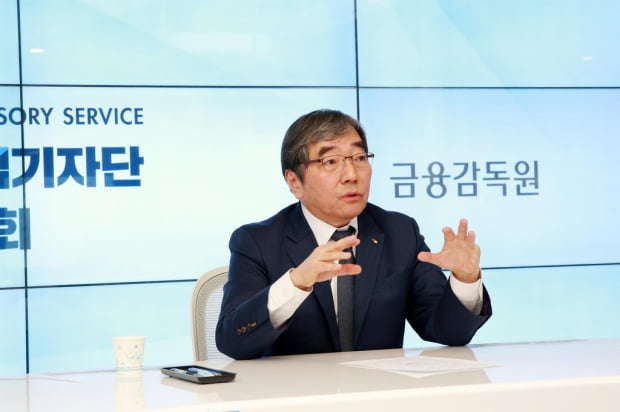“It is necessary to collect opinions on the application of DSR by borrowers… Financial industry-supervision should be separated”
“Private management company caught some predatory finance”… “High volatility, long-term approach” in stock market boom

Financial Supervisory Commissioner Yoon Seok-heon announced on the 23rd that he would maintain the total household debt management system ordered by the end of the year.
The dividend payout ratio for banks is expected to be adjusted at 15-25% level, and he urged attention to high volatility in relation to the current stock market boom.
In order to prevent the recurrence of large-scale financial accidents such as the private equity crisis, the financial industry policy held by the Financial Services Commission and the financial supervisory policy should be separated again.
Director Yoon made such a statement at the year-end conference with the entrance reporters held online (non-face-to-face).
Regarding household debt, he added, “The increase in household loans in the second half of this year, especially last month, was very steep, centered on credit loans.”
He stated that it is necessary to introduce DSR regulations for borrowers in the long term to manage household debt.
Director Yoon said, “It is desirable to borrow and use debt within the range that can be paid off against income, and this is the regulatory method adopted by most developed countries.”

However, regarding the possibility of applying the total debt repayment ratio (DSR) per borrower next year, he said, “We will not cause side effects by introducing DSR regulations suddenly as some are concerned.”
In the context of risk management, financial authorities believe that the banking sector should reduce dividends to increase its ability to absorb losses.
Director Yoon said, “We are still in coordination with the financial sector, but I think the dividend payout ratio will be between 15 and 25%,” he said.
As a result of conducting a stress test on banknotes to determine an appropriate level of dividends, it was amplified that many financial companies did not pass the capital test during the’L-shaped’ economic recovery path, which prolonged the recession.
Regarding the stock market, which is hitting a record high every day, he said, “If you look at the sluggishness of the real economy and excess liquidity caused by Corona 19, the volatility of the stock market is very high.”
He added, “There is a need to approach from a long-term perspective rather than a short-term perspective.”
The financial supervisory system, which is currently divided into the Financial Services Commission and the Financial Supervisory Service, is leading to consumer damage.
Director Yoon said, “We are considering various alternatives regarding the need for independence from the Financial Supervisory Service (FSS).”
Director Yoon said earlier that he would submit the’Financial Supervisory Service Independence Plan’ to the National Assembly at the National Assembly audit, and continued his intentions on this day, saying, “There is a need to reorganize the supervisory system.”
According to the current Financial Services Commission Act, the Financial Services Commission oversees financial policy and financial supervision.
Among them, the Financial Supervisory Service is entrusted with the duties and powers of financial company inspection, supervision, and administrative sanctions.
Director Yoon diagnosed that “currently occurring financial accidents such as the East Asian crisis and the private equity crisis show a specific type.” “Risks are created in the process of the government’s efforts to foster the financial industry, and the risks are eventually leading to consumer damage.” did.
“Under the dual supervisory system, the responsibility between the supervisory policy (Financial Commission) and the execution (FSS) becomes unclear.”
Regarding the current financial industry policy and supervisory policy that the Financial Services Commission is in charge of, he stressed that “the mutual check relationship must be maintained” and “in other words, the financial supervision must maintain minimum independence.”

Regarding the private equity crisis, he apologized, saying, “As a person in charge of financial supervision, it is unmatched to regret,” but even though the private equity market has grown significantly due to deregulation, it was defined as an incident that caused consumer damage due to insufficient supervision .
In a thorough inspection of 10,000 private equity funds and 232 private equity management companies, it was revealed that cases of private interests of some managers and predatory finance were found.
Director Yoon said, “It is not a case involving large-scale investor damage like Lime and Optimus,” he said. “Specific details will be announced soon.”
When asked if it is possible to compensate 100% by’contract cancellation’, which was applied to some Lime funds in Optimus Fund, he said, “I am looking for a conclusion about contract cancellation and incomplete sales, but please wait a little more.”
The question about whether holding companies such as Shinhan Holdings can be included in the face of sanctions on banks selling Lime Fund, he said, “an internal review is underway.”
/yunhap news
